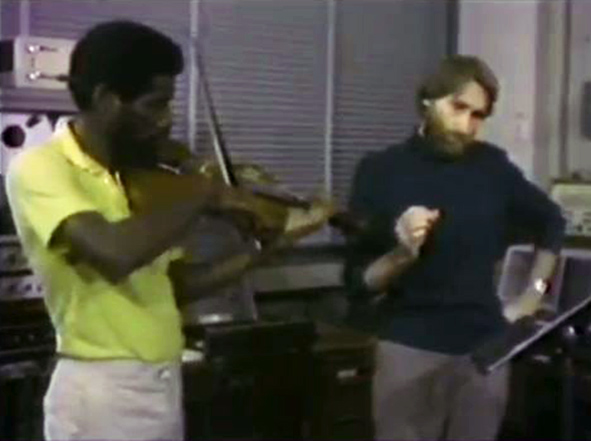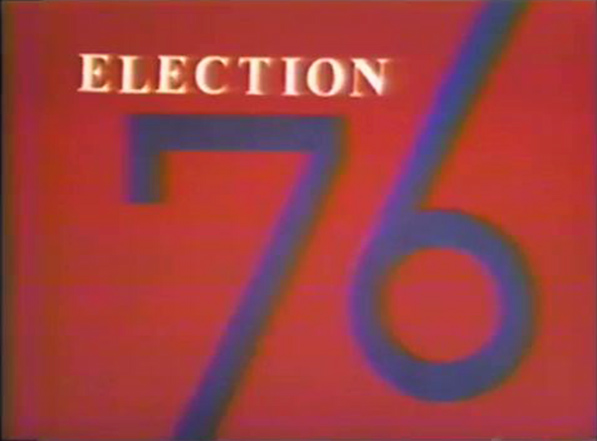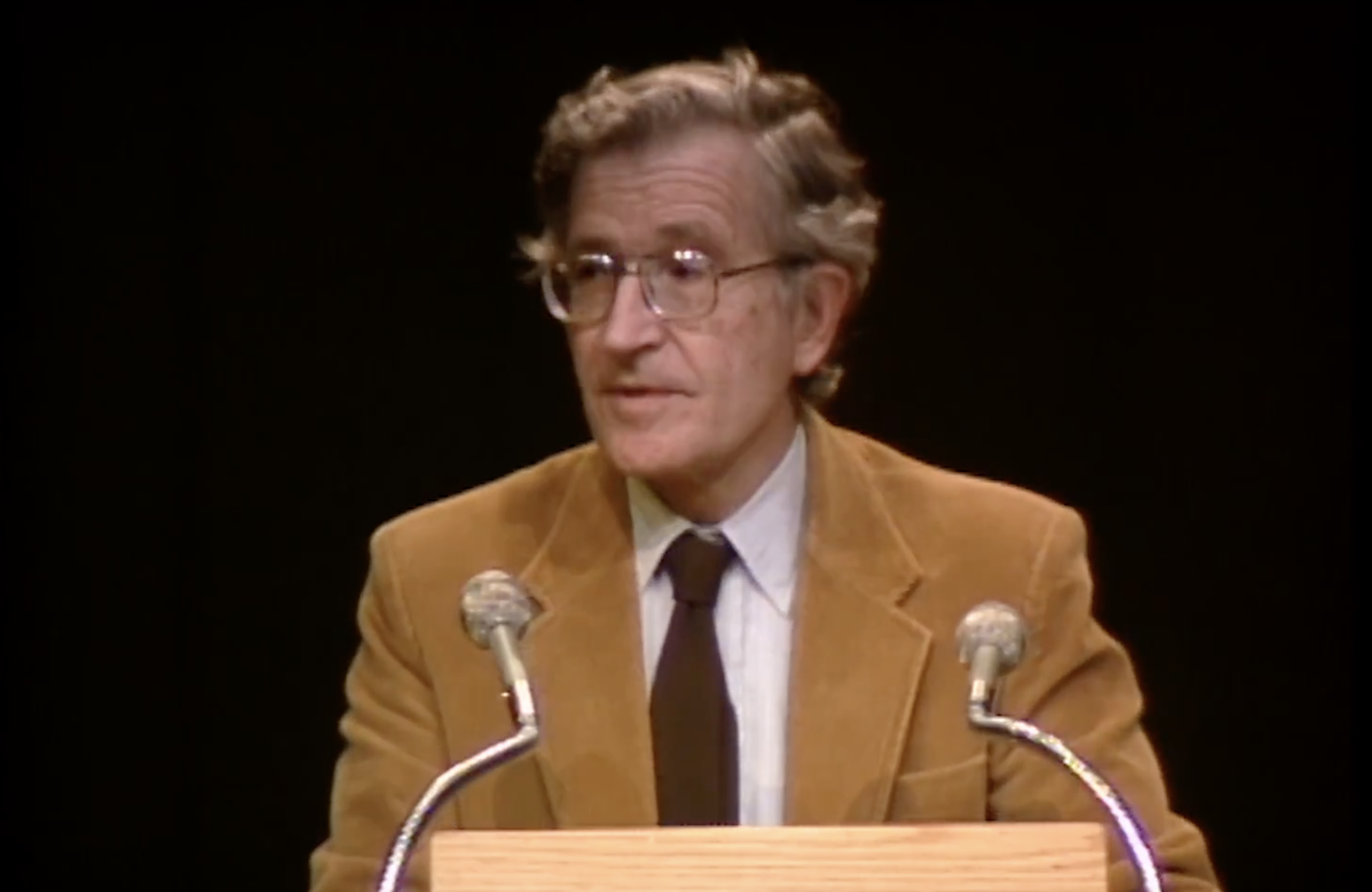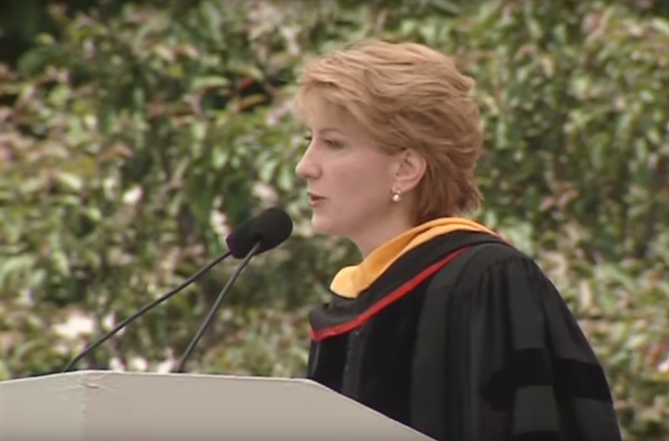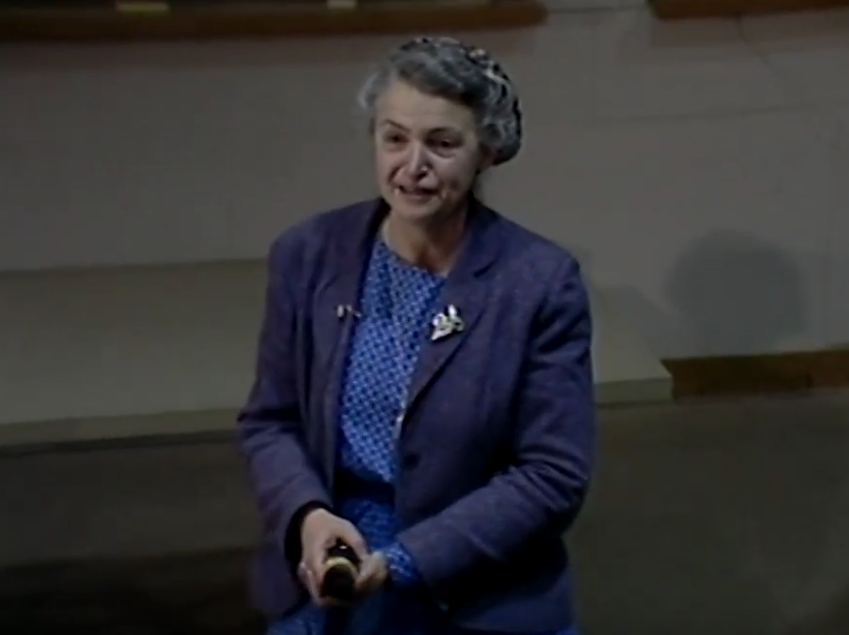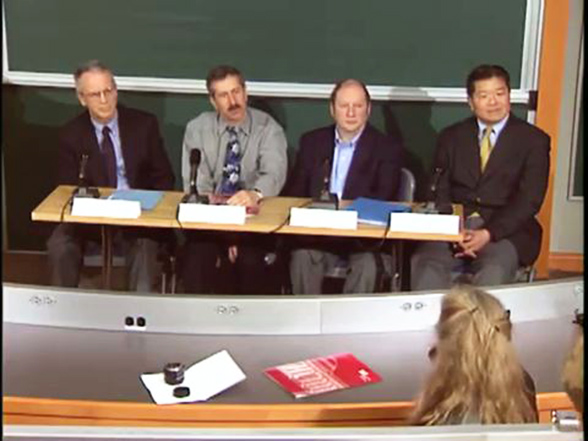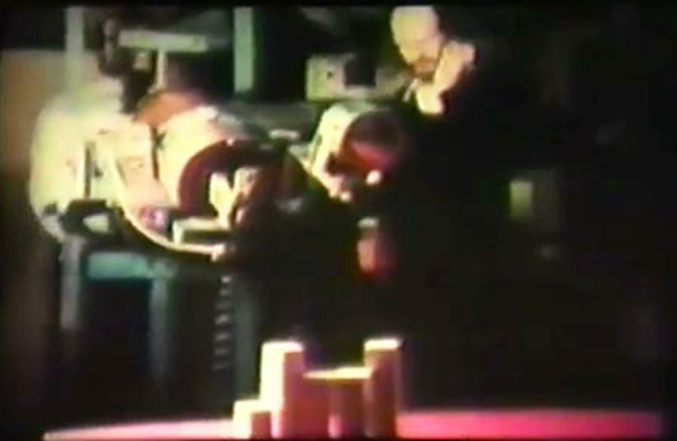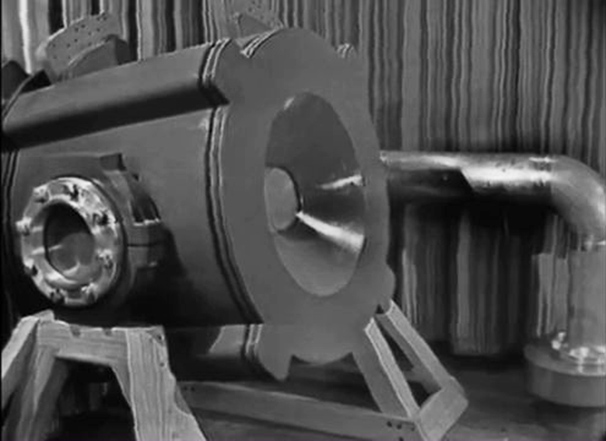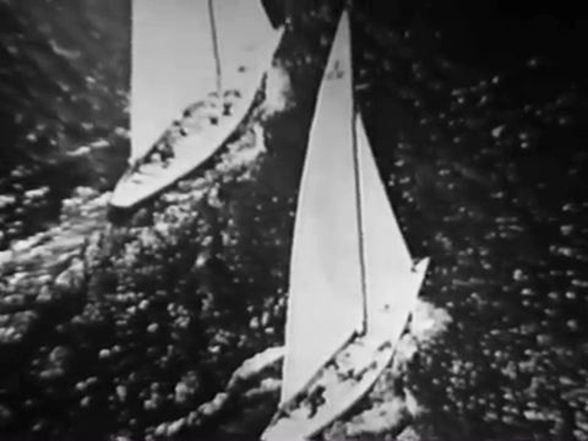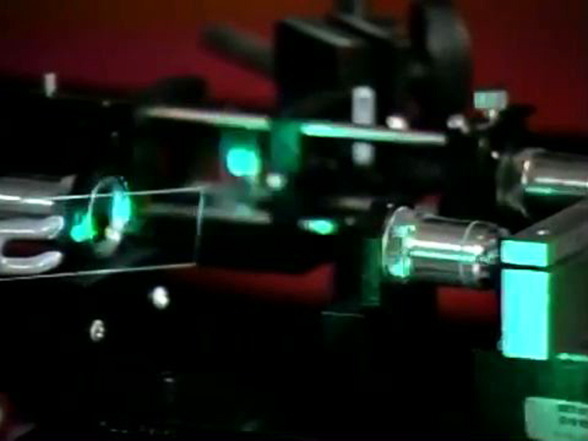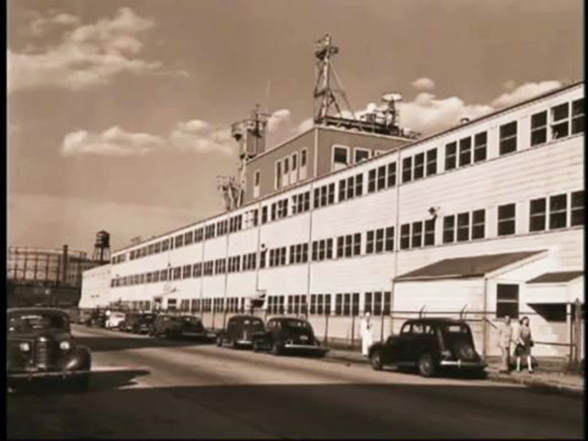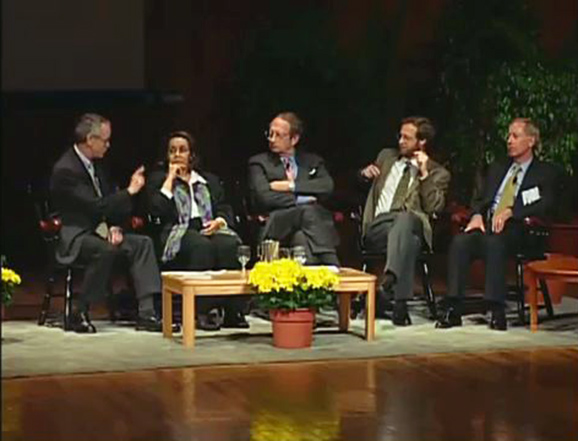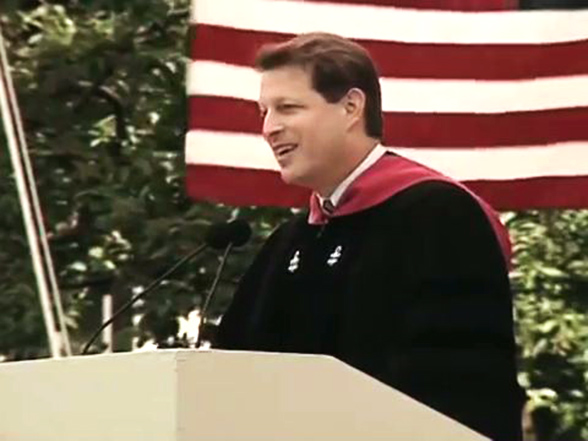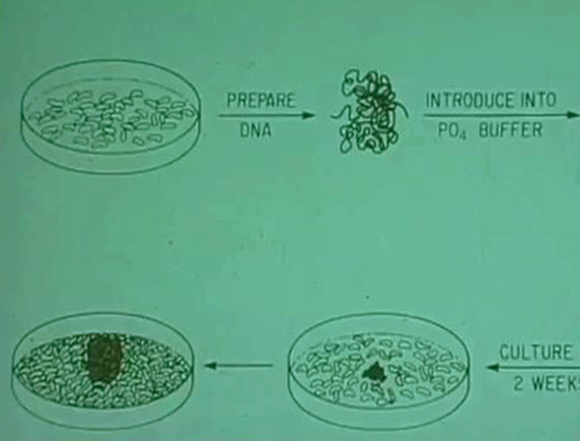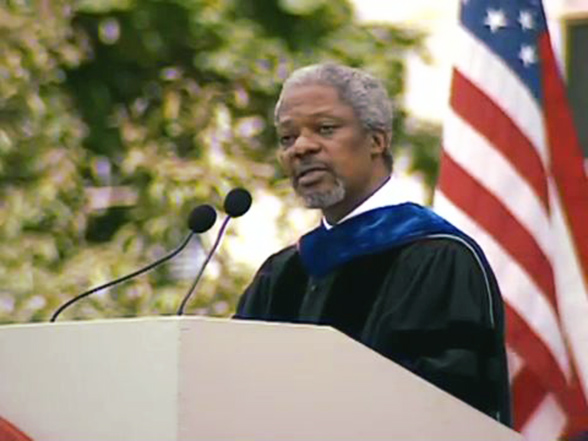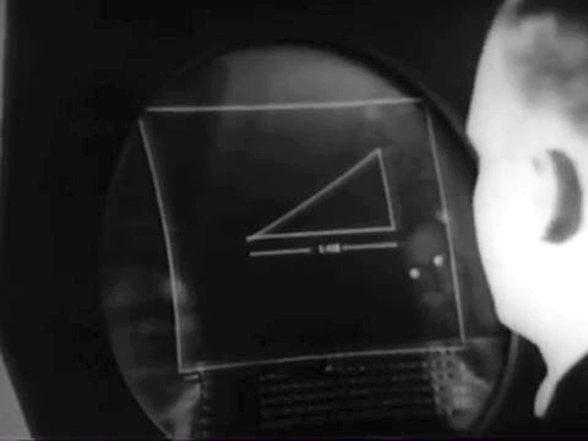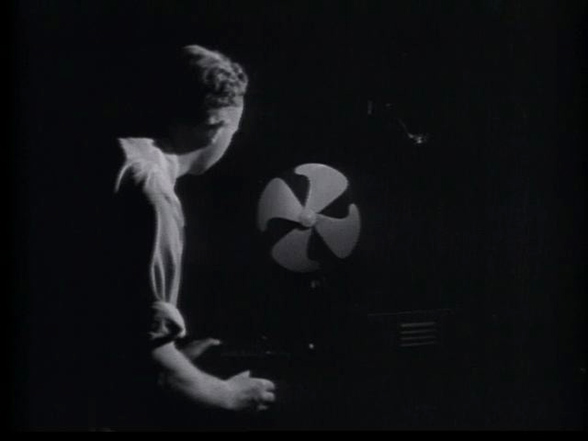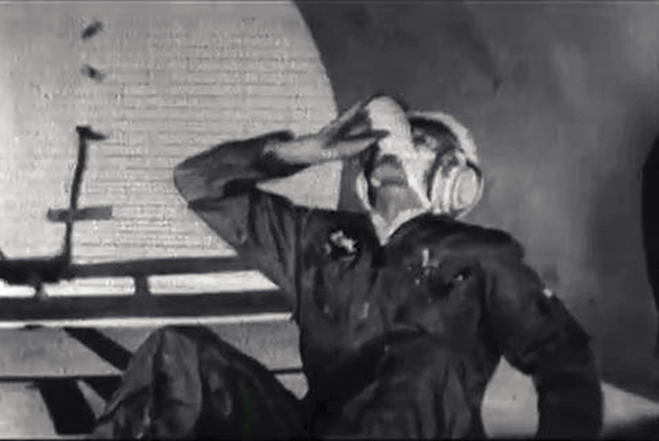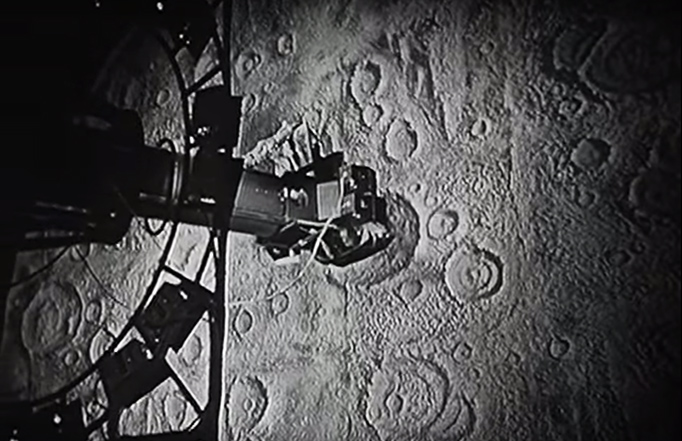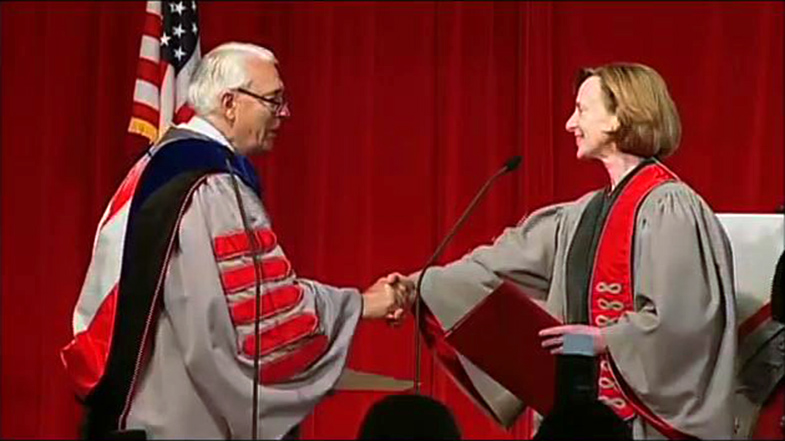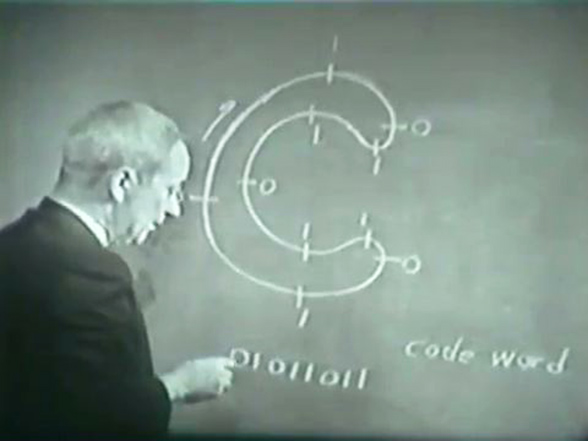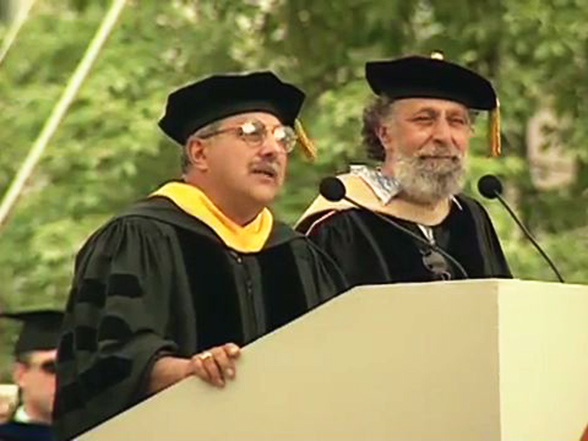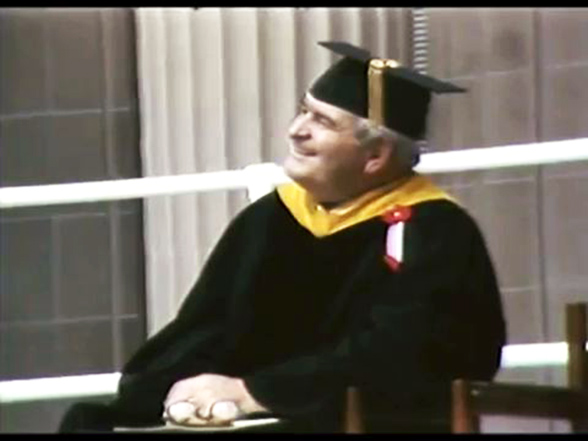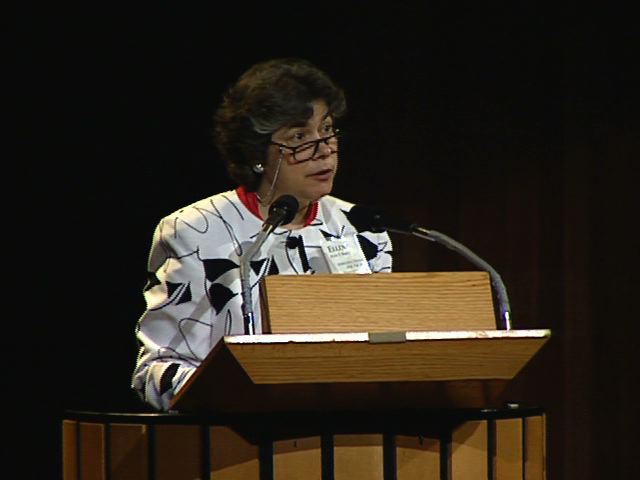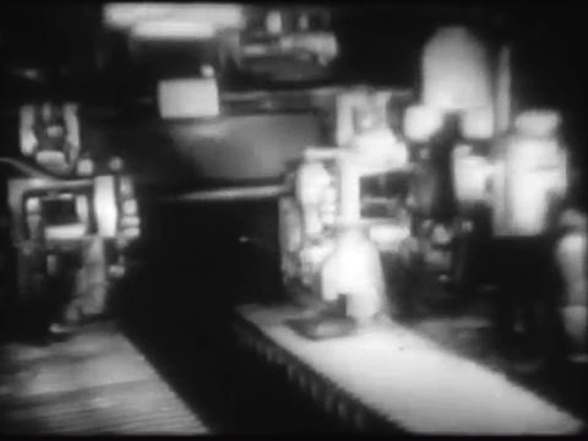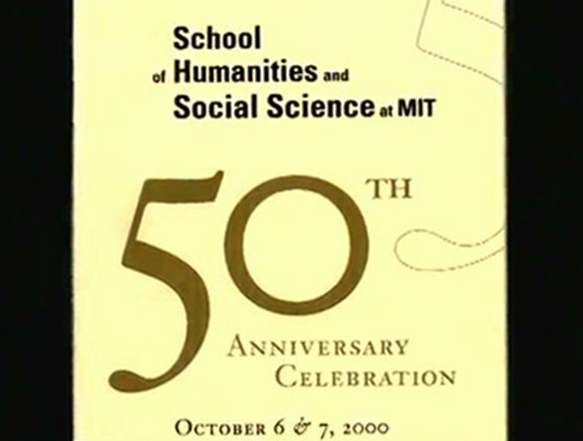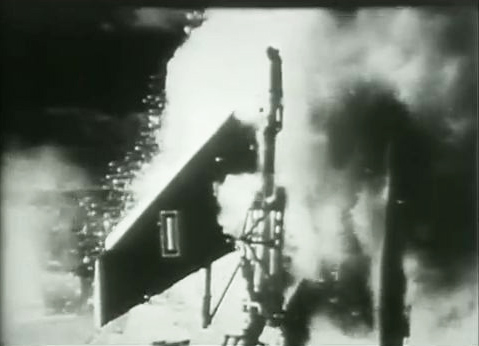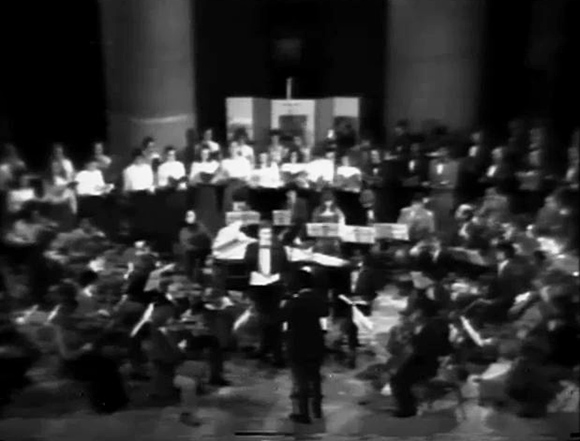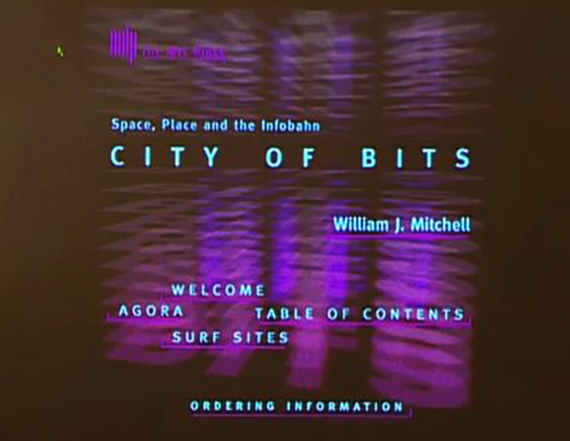MITV "Election '76"
CARTER: I believe in the greatness of our country, and I believe the American people are ready for a change in Washington. We've been drifting too long. We've been dormant too long. We've been discouraged too long. And we have not set an example for our own people. But I believe that we can now establish, in the White House, a good relationship with Congress, a good relationship with our people, set very high goals for our country, and with inspiration and hard work, we can achieve great things and let the world know-- that's very important. But more importantly, let the people in our own country realize that we still live in the greatest nation on Earth.
FORD: I've been proud to be president of the United States during these very troubled times. I love America, just as all of you love America. It would be the highest honor for me to have your support on November 2. And for you to say, Gerry Ford, you've done a good job. Keep on doing it. Thank you, and goodnight.
[MUSIC - "HAIL TO THE CHIEF"]
LUKITSH: Good day. My name is Nancy Lukitsh, and this is Election '76. In this program, we will be discussing the candidates, the conventions, the debates, and the campaign in general. With me in the studio are Professor Dean Burnham and Professor Jeffrey Pressman of the MIT political science department and Professor Christopher Arterton of Yale University. Gentlemen, I'd like to begin this discussion with talking a little bit about the campaign in general. Has it been a good campaign? A bad campaign? Interesting, dull? How would you characterize it?
PRESSMAN: I think good, bad, interesting, and dull is not a bad way to do it. But I'll leave it to my colleagues to fill in some of the initial boxes.
BURNHAM: It seems to me that the Ford campaign has been as good as or better than could have been expected in July, while the Carter campaign has been something of a disaster. And it may prove in the end tomorrow to have been a disaster if, as is entirely possible, Mr. Ford finally scrapes through with 280 electoral votes or something like that. The Carter campaign has had serious deficiencies. It would take a very long time to catalog them all. But my personal view is that a major problem for them, for Carter and his staff, has been trying to figure out that they're not running in a southern primary anymore. They made that transition, I think, sometime after the first debate. Maybe sometime toward the end of September. But already by then, the gap had narrowed as you look at the polls to not much different than what it is now.
ARTERTON: I thought it was interesting that you started off by saying that Ford had done better than could have been expected. I think it's fair to say that if Ford wins this, he owes his election to Ronald Reagan. That is the trying that Reagan gave him, the testing out of a team, developing abilities on the stump, commanding audiences, speaking before television-- all of those things are skills that Ford has developed in the last year. The Ford that we're seeing on camera today is very, very different than the Ford of a year ago. And a lot of that, I think, is owed to the challenge that Reagan put up against him.
PRESSMAN: But I think in terms of the overall campaign, from the point of view of a student of politics, it's really been endlessly fascinating. We've had surprises throughout. Almost every primary brought a new surprise. Jimmy Carter came from literally nowhere to achieve the nomination and, having built up a 33 or 35 point lead, he then proceeded to see that lead wither away to a more realistic level. I don't think that that lead was as real as it seemed. So it's somewhat harsh to blame Carter as many people in the media are doing, blowing largely with those these great movements, switches of areas of the country of ethnic groups. All of that has really made the election, in many ways, anything but boring, although the treatment of the issues and the stressing of themes has, at most times, not been uplifting.
LUKITSH: Do you think there have been any major issues that have been covered in the campaign? Has it revolved around anything in particular?
PRESSMAN: I think the most real issue in the campaign, to the extent that any has been addressed, is the economy, with President Ford putting more emphasis on fighting inflation and Governor Carter putting more emphasis on working on unemployment. I think the other issues-- they haven't really disagreed fundamentally on foreign policy, they haven't disagreed fundamentally on Earl Butz or Playboy magazine or any of the other issues which have achieved some notoriety in the campaign. But I think the economy is an issue which has been increasingly a cutting one. And that's where the candidates differ the most, I think.
ARTERTON: But part of the lack of real discussion of the issues is not fair to lay against the media, but is directly related to the strategies of the two campaigns. I remember seeing both of the advertising managers for Ford and for Carter talking about the issues that they were developing, and seeing those issues only as instrumental to developing characteristics of the candidates. That is, you can use the economy as an issue, but you use that as a way of showing Carter being competent to run the government, Ford being trustworthy and running the government, showing progress and so forth.
BURNHAM: Sure, because the nature of our presidential elections has undergone progressive transformation with the help of media and also with the help of the fundamental change in the position of this country in the world over the past 35 to 40 years, so that everything becomes no longer a question of teamwork, but this one super arching individual who-- let us never forget-- always has access to the button even if he doesn't push it.
LUKITSH: So you think it's become more of a campaign of images than issues?
BURNHAM: Absolutely. No question about it. And issues are processed in very much the kind of way that Chris has just said. The net result of this is-- I'm convinced, for reasons I'm not quite clear about, but nevertheless I'm convinced there's a link-- tends to produce a wide degree of disenchantment and hostility among the electorate. That somehow they feel they are being used or manipulated and that their concerns are not really the concerns of these media imageries, but that the people involved are simply playing upon them in order to win votes and win an election. And they're right.
LUKITSH: Do you think that any of this reaction is a result of Watergate and the feeling that the American people had one put over on them by the glossy image of Nixon.
BURNHAM: No question about it. There was a fine little column by Russell Baker a couple of Sundays ago in the New York Times' magazine section in which he brings out Honest John Grogan, the man who's been delivering to the tombstone vote in Chicago for 48 years. And he proceeds to go through the whole argument that the abstention we're likely to see this year is not in any way a lack of interest. It's that people have been spooked and scared off by realizing that they've been supporting the winners of the better presidential elections and look what that's gotten them. Johnson. Nixon once, Nixon twice, bam.
LUKITSH: Also as a reaction to that-- something that's been instituted this year, this past election, has been the federal finance laws, the campaign finance laws. Do you think that's had an affect on the campaign as far as limiting it or shifting the emphasis at all?
ARTERTON: There's no doubt that it's had a pronounced impact on organizing on the state level. It's not a clear cut and easy to understand impact. But one thing that it certainly has meant is a diminishing in the amount of money that can be spent on volunteer efforts, using people to get out and distribute leaflets and so forth. All of that costs money, and when you have a limited pool of money, both candidates have seen fit to plug about half of that into media, principally advertising on television. The other thing that it's meant that the national campaigns have very little leverage over the state campaigns. And so you get tremendous variations, this time, as to how effective the state campaigns are. I think it's not quite meaningful to speak of a national presidential campaign except when you're talking about the candidates flying around on the airplane, buying media time, and so forth. But in terms of the organizing on the state level, all of that is done discreetly. And so I think we may find decided differences as you look cross-state in the amount that turn out for Ford or the amount that turn out for Carter. I think that's related to the financial strictures.
PRESSMAN: But throughout-- not only in the expenditure side, in which we've had a lack of bumper stickers and buttons, for example, which has made the campaign more antiseptic-- a lack of a reason to go on the candidates' part and raise money from people has meant that you see less of the campaign. And so it's really often in a separate cellophane container. And the candidates come out for the debates, and you see them there. But it isn't the constant contact and enthusiasm that you'd have in other years. And I think that really hurts the Democrats by damping down enthusiasm, depressing turnout, and not giving Democrats the feel of politics. I'm not sure that Republicans are as much into that kind of thing. But I think for Democrats it really is hurting.
BURNHAM: I think anything that narrows the scope of conflict helps the Republicans and hurts the Democrats. And this is one major contributor to the that. There are plenty of others.
LUKITSH: OK you just mentioned a few minutes ago the debates. What I'd like to do now is maybe take a brief look at a clip of the Kennedy-Nixon debate. And then we've got a small clip of the last Ford-Carter debate in Williamsburg. I'd like to look at those for a few seconds and then come back and talk a little bit about the debates and what effect that's had on the campaign in general.
KENNEDY: I come out of the Democratic party, which in this century has produced Woodrow Wilson and Franklin Roosevelt and Harry Truman, and which supported and sustained these programs which I've discussed tonight. Mr. Nixon comes out of the Republican Party. He was nominated by it. And it is a fact that, through most of these last 25 years, the Republican leadership has opposed federal aid for education, medical care for the aging, development of the Tennessee Valley, development of our natural resources. I think Mr. Nixon is an effective leader of his party. I hope he would grant me the same. The question before us is-- which point of view and which party do we want to lead the United States?
MODERATOR: Mr. Nixon, would you like to comment on that statement?
NIXON: I have no comment.
FORD: The United States is leading the free world out of the recession that was serious a year, year and a half ago. We're going to see unemployment going down, more jobs available, and the rate of inflation going down. And I think this is a record that the American people understand and will appreciate.
MODERATOR: Governor Carter.
CARTER: Well with all due respect to President Ford, I think he ought to be ashamed of that statement because we have the highest unemployment rate now than we had at any time between the Great Depression caused by Herbert Hoover and the time President Ford took office. We've got seven a half million people out of jobs. Since he's been in office, 2 and 1/2 million more American people have lost their jobs. In the last four months alone, 500,000 Americans have gone on the unemployment roll. In the last month, we've had a net loss of 163,000 jobs. Anybody who says that the inflation rate is in good shape now, ought to talk to the housewives.
LUKITSH: What we've just seen is a small clip of the first Kennedy-Nixon debate and a small clip also of the last Ford-Carter debate. What I'd first like to ask you is, how do you think they compare? Kennedy-Nixon with the Ford Carter.
BURNHAM: Well my view is that Kennedy-- I know he's dead and he's now a statesman for that reason and all. But I think that Kennedy just had a much more powerful and sustained ability to deliver a message. Now in the context-- of course, that particular clip is perhaps misleading because it's just one thing, but he is talking solely as a representative of a great party with a great tradition. Mr. Carter is not doing that to the same extent, and there is just something off. Now between Nixon and Ford there's no question which of the two is more intelligent. Although Nixon only was confined to no comment, one would not have much difficulty identifying the relative presence and so on of the two men.
LUKITSH: What do you think the general effect of the debates has been?
PRESSMAN: I think they really raised some of the differences between the candidates. Before criticizing the debates, which people are very inclined to do, I think that they should be asked to consider what the campaign would have been like without the debates. And it really wouldn't have been much of a campaign. So to the extent that the debates focused on some of the issues-- mostly domestic economic issues, although some civil rights and civil liberties issues as well, which crept into the third debate-- to the extent that those issues have been raised, I think the debates have been useful. I think that was true in the first presidential debate, the last presidential debate, and the vice presidential debate. The foreign policy debate, I think, uncovered no real differences between the candidates, some misleading apparent differences between the candidates, and a difference in style. It was very helpful to Governor Carter, but not because he showed a vastly superior command of the issues.
ARTERTON: I don't think anybody should've expected that the candidates would debate the issues. I think both of these men have learned a great deal more about the use of television in campaigning than either Nixon or Kennedy knew. I think they both profited from the Kennedy experience, and they both tended to treat these as press conferences in which they alone were standing up there, in which they could answer or not answer the reporter's question, in which image was important.
PRESSMAN: They were so mesmerized by the Kennedy experience of the first debate, they both got on, and for the first half hour, read statistics to each other, with nothing else in between, both sounding for all the world like an extreme version of what Kennedy had tried to do.
BURNHAM: It seems to me that the big point here, once again, is that what you're talking about is the manipulation of media imagery. And that this is one more way by which you attempt to use issues and use people's concerns for issues for non-issue purposes.
ARTERTON: I was only going to say that, in terms of the impact on the vote, most studies that I've seen have indicated that it's been like the '60 debates-- very important in shoring up a candidate's support, and taking people who were leaning and committing them to actually voting for their candidate. But there have been very few people who've been persuaded from an undecided position or from, say, even supporters of Carter. Very, very few have gone over and decided they'll now support Ford. It's even been noticeably unsuccessful in coverting the undecideds. And I think that's probably as it should be. I think that being a good debater, even if they were debating with each other, being a good debater is not necessarily a criterion for being President of the United States, and I think most of the people, most of the voters, recognize that that's one aspect, but not a major ingredient, of being a chief executive.
LUKITSH: Do you think the American people benefited from these debates, aside from the images that were brought to us? Do you think we learned anything? Yeah, did we learn anything about the candidates?
BURNHAM: I think so. Do you think that will-- do you think it'll just, as Professor Arterton-- it'll just shore up people who are already decided?
PRESSMAN: I think that is the overwhelming tendency as far as I can judge from these post-mortems that were held after the debates. Shore things up pretty much. I think that-- Professor Pressman is absolutely right, that without the debates, whatever one wants to think about them, as Grand Theater or as tappingly fundamental roots of political philosophy for our time or something. Without the debates it would have been a very, very different campaign, and a much less satisfying one, a much less revealing one. I think that if you paid close attention to both of these candidates, you learned a great deal about them.
PRESSMAN: I think they really did demonstrate some of the fundamental differences between the parties, and the voters became more aware of that over time. Not necessarily to Governor Carter's benefit, but I think that the perceptions were sharpened. I think that even if the debates did not result in switching a huge number of voters-- that shouldn't be the criterion by which they're judged. If they do shore up a candidate's support, that can be useful too, but the important thing is that they gave the voters more of a sense of what these people were about and what some of the different issue emphases were at any event.
LUKITSH: Do you think that this is going to be an election year tradition? Are we going to see more debates every four years?
PRESSMAN: I think it'll be a hard tradition to break, particularly since, in this case, an incumbent president agree to them.
BURNHAM: Well, not only agreed to them, but actually volunteered them. Of course, being 30 points behind in the polls, he had nothing to lose at the time.
LUKITSH: Do you see any reversal of this trend that you've all pointed out, this image trend toward voting images as opposed to voting issues? Is there going to be any reversal to that?
BURNHAM: I don't know. I'd like to think so, but my guess is that there certainly won't between the major parties and the major party candidates because they all seem to deal with people in the media, and among their advertising experts and so on, who persuade them that that's the only way you can win an election. It would be very refreshing if a major party candidate came along at some point and said, well I know what the conventional wisdom is, but I really am going to just try to forget about my personality and talk about the things that are tearing the country apart or something. It would be pleasant to see that, but we haven't had any such examples lately. I think that what you're going to probably do is either narcotize the country once and for all, or possibly, in a period of great distress in the economy and elsewhere, produce an enormous backlash that will bring somebody to the fore who will perhaps do that, outside of the mainstream of the two major parties.
PRESSMAN: I think the media has not altogether encouraged the discussion of issues. The people in the press say that they want issues discussed, but any time a candidate puts forward anything specific, they are on it like all future Woodward and Bernsteins trying to find out the limitations of it, little flaws in it. And that's very hard to defend against. And also the way in which the media people have judged that you've either won or lost a debate is not to make a major mistake. Well if you're going to have anything you say picked apart, and you're going to be judged on either making a mistake or not making a mistake, and you go out on a limb and start talking about issues, you're really taking an enormous risk. So I think there's a little bit of perhaps hypocrisy here in media people asking for a discussion of issues, but then acting, in a number of ways, to discourage that.
ARTERTON: Also, I think that it's not necessarily irrational for voters to consider or try to base their election decision, their voting decision, upon the characteristics of the two candidates. That is, a lot of people talked about Richard Nixon and the faults of his administration as fundamentally coming out of sort of a narrowness of spirit of the person himself. And I think the voters are trying to get at that kind of character level. The problem is that understanding that the candidates have been very good at trying to manipulate those characteristics. And Carter, I think, has probably been better at it than Ford has. And a lot of it is just ginning up his family and having sort of a new story every week. Having his mother, his faith healing sister, his gas station brother, his little daughter Amy, his super aggressive consultant wife and so on.
PRESSMAN: But don't you think that was really much more true in the primary campaigns? Now I think that people are landing pretty hard on Carter's character. And I think this the perception is probably Ford is a nicer guy with doubtful policies. Whereas Carter is a little bit narrow and rigid, though he might be a better president. So I think the very character issues that Carter raised and dwelt on are now coming back to haunt him. I think there may be a little too much amateur character searching in this election myself.
ARTERTON: I do too. I think that trust was a very effective primary campaign theme to get across, but it doesn't seem to cut very well against Gerry Ford, who large segments of the electorate trust.
BURNHAM: Well sure. And don't forget the very important-- one of the very important subterranean issues in all this, which is what you might call the thing that Dole botched up eight ways from Tuesday when he referred to the Democrat wars. The truth of the matter is that Mr. Carter's party has occasionally projected leaders into high office who have had a rather messianic view of what can be accomplished in the world at large. It's a view that really is fundamentally opposed to that which Mr. Kissinger stands for, for example, which is anything but messianic, and certainly anything but moral or moralistic or whatever you want to call it. Well, it wasn't too long ago that we went charging over the top in Vietnam, for the best of all altruistic reasons, one would have one think. And there is the sense among many people that this is also an issue. And Mr. Ford and his friends have been trying to capitalize on it as much as possible. Admittedly, if Ford had his way, we would have probably had the 102nd Airborne Division fighting somewhere in the middle of Angola at this point. But voters don't pay attention to that stuff. I mean, the truth is you've got peace. Under a Republican administration. You can choose between the party of depression or the party of war.
LUKITSH: One of your colleagues, Edwin Diamond, is very interested in character, and he's also interested in media. He was also at one of the debates, at the last debate, a couple of weeks ago. And he couldn't be with us today, but he was with us on Friday, and we pre-taped an interview with him in which he discusses a little bit about the debates and about the campaign in general. So we're going to look at a 10 minute pre-taped interview with Ed Diamond right now.
Why don't you tell me first what the debate was like in Williamsburg. And who won?
DIAMOND: OK, I was in the historic hall when the historic debate took place. As a result, I did not see very much. I did not hear very much. I don't know very much what happened. That's semi-serious. The truth of the matter is that the debate was not set up for those of us in the auditorium. It was set up for the great television audience out there. So it was very hard to hear in the studio. It was very hard to see, and you had this tremendous effect of-- the candidates are right in front of you, but you keep looking over towards the monitor. Even though you're in the room with them, you're watching them on television. Someone said all gestalt and no reality. Nevertheless, the fact that I couldn't hear well or couldn't see well does not permit me-- does not stop me from having an opinion about who won. I thought Carter did win the last debate, win in the sense that the audience responded to him more, the critics responded to him more. I thought he won by being audacious, by giving strong answers, and although he kind of moves up and down, I thought he concluded-- I felt he did conclude very strongly. With Gerald Ford, it's what you see is what you get, this steady plodding. And depending-- either mediocrity or a safe figure, depending on your perspective. As far as the effects of the debate, early on, I interviewed Pat Caddell, who is Carter's chief pollster. And I wrote about this. Caddell said debates are not conversion mechanisms, they are reinforcement mechanisms. Translation? You talk to your people. Ford tries to reach Republicans. Carter tries to reach Democrats. And I think if you look at polling, and if you look at some of the results of the debates, you will see they were reinforcement mechanisms. Carter leaners felt better about Carter. Ford leaners felt better about Carter-- about Ford, excuse me! And the undecideds tended to break down.
LUKITSH: How you compare these to the Kennedy-Nixon debates?
DIAMOND: As you know, in our class in 1724, we show the Kennedy-Nixon debates and we show the Carter-Ford debates. I happened to cover the second Kennedy-Nixon debate. One of them, I was at one of them. And the press room is the same. There's the bar, reporters interviewing each other. Candidates may change, but the press and its habits, bad and good, remain the same. I thought, in looking at the tapes again of Kennedy-Nixon, that there was a kind of disdain that Kennedy had, and a coolness. And a certain shifty-eyedness that Nixon had that came through. In that sense, if you had to say, of the four people-- or six people if you factor in Dole and Mondale-- you have to say, who was the most effective? I would say that Kennedy was the most effective. But then, I'd put maybe Dole next. Even though I found Mondale clearly the more intelligent and more serious candidate. And many people, by the way, Tuesday will be casting their votes for Mondale rather than for Carter. Or against Dole, rather. I felt that Dole had a certain conversational style that was good for television. And while you and I may-- I won't speak for you. Whereas I may not have cared for Bob Dole's style, I think it had a certain effectiveness among his constituency out there.
LUKITSH: Can you tell us a little bit about the atmospheres at the last debate? Were the candidates nervous? Was there a sense of playing it safe there? I expected them both to play it safe. I thought that Carter gambled. I thought he gambled by voluntarily bringing up the Playboy interview. I spent an hour with-- this name and place dropping-- I spent an hour with Hamilton Jordan, who is Carter's campaign manager the next morning, Saturday morning in Williamsburg talking about the press coverage and the campaign so far. And he told me, he said, we specifically-- whether anybody asked us to or not, whether anybody brought the Playboy interview up or not-- we were going to bring it up. We wanted to get it on the scoreboard by saying it was a mistake, we apologize. We thought that was the best way to handle it. So quite early, instead of playing it safe, he went out and confronted the Playboy thing, which, Jordan said, was hurting them with middle-aged women voters.
LUKITSH: Do you think that was effective, the attack on that?
DIAMOND: I thought it was effective. And the polls would suggest-- the Roper poll taken right after the debate suggested 40-29 that Carter won the debate. But as Gerald Ford and Jimmy Carter often say, the only poll that counts is the poll on election day. And I must say I'm beginning to get depressed in that and letting my true feelings show through. I'm concerned about result Tuesday.
LUKITSH: Can you tell us a little bit about why?
DIAMOND: Well, you'll talk to Burnham, Pressman, and Arterton, professors in this program, later or earlier or maybe you've already talked to them. But Carter looks to be slipping away. The Carter lead seems-- we are being taped on Friday afternoon, let the record show. And as of Friday afternoon, the Carter lead seems to be slipping away. I would still think he's going to win. But.
LUKITSH: Did you get any of that feeling? You were with his campaign.
DIAMOND: Yeah, they were confident. But I also think a little whistling in the dark confidence, whistling past the graveyard. You have to talk a big game. And a lot of the indicators say it's going to be Carter. Electoral votes, the big states, the solid south-- but God, it's a volatile situation. I am prepared to here that Gerald Ford is next-- four more years! I'm prepared to hear that Tuesday night.
LUKITSH: Well, and you have a kind of special stake in this election. Do you want to tell us a little bit about the book that you're planning on writing?
DIAMOND: I try to be very objective and neutral, and I think I am when the occasion calls for it. The occasion doesn't call for it right now. Professor Bruce Mazlish and I-- Professor Mazlish is Chairman of the Department of Humanities here. We are planning to do a biography in-depth of Carter. A psychohistory of Carter, President-elect Carter. We have already been to Plains. I've been down there several times. Professor Mazlish and I spent an hour interviewing the candidate. We wrote up our first crack at him in New York Magazine in August, a psychobiography. If he wins, November 3 we will begin the full scale research and interviewing necessary for what we hope will be the single best biography of this enigmatic, fascinating, perplexing, hard, soft, arrogant, compassionate human thing. I think he probably will squeak by on Tuesday. And we think he may make a very controversial, volatile president, which might be bad for the country, but good for our study.
LUKITSH: And there's been some controversy about psychohistory. How does Carter feel about this?
DIAMOND: Well, I must say, he's very open. You have to admire his openness. Here come two dudes from MIT down to-- and they want to talk about his-- want to talk to his mother, his sisters, his brothers-- as I did, as we did. When I talked to him, when I got into very personal material, he was very open. He answered all of our questions. He-- he bared his soul, we think, to us. And at the end, he said, you all come back soon. Bruce Mazlish said to him, you know we can't do this on the basis of one interview. We have to see you again. And he said well, we'll arrange that. And he could be putting us on. That may be part of their game of massaging, stroking the press or stroking the academics. But I think not because William Greider of the Washington Post, a friend of mine, went down there, and the campaign gave him permission to ask Mrs. Carter, Lillian Carter, Jimmy's mother, to give him papers he wrote as a student, a 12 year old student. To give him the diary he kept when he was in the Navy. To give him the letters he wrote while he was away on service. And all that material was dumped-- was handed to Greider to look through. And I suspect that if he wins, when we show up down in Plains, they'll give us the same material too. So that's-- you could say he's very open, very confident, very serene about himself. He has nothing to hide. He really does believe that the government leaders, our political leaders, our public leaders, should be open books for scholars and for press.
LUKITSH: It's an interesting way to look at it. How would you characterize this whole campaign?
DIAMOND: Strange. Very strange. I thought Carter had a big lead. He didn't sit on his lead. I don't know what errors-- I think Professor Burnham may get into this. I thought Carter had a lead, but perhaps Carter failed to galvanize. If he does lose, it's because he failed to galvanize democratic voters. Or it may be because the kind of people who tend to vote Democratic don't show up in proportion on election day-- the poor, the black, the inner city, the ethnics. They tend to vote in lesser numbers than the white, the well-to-do, the better educated, the suburban. If Ford wins on Tuesday, it will be because the suburban, white, middle class vote went out for him.
LUKITSH: OK Ed, bottom line. Who's going to win?
DIAMOND: If I had to bet, I'd bet today, Friday, on Carter. But to protect myself, I'll say Ford might do it in the upset of the century.
LUKITSH: OK thank you very much, Ed. We appreciate it.
DIAMOND: Thank you.
LUKITSH: What we just saw was a taped interview with Edwin Diamond, done last Friday. What we're going to look at now is a piece of tape that was done on the convention floor in Kansas City. This shows Dan Rather after the incident concerning vice president Rockefeller, where he tore-- he removed a sign from a Reagan supporter. And the Reagan supporter ripped out his phone. What we would like to do is look at a piece of tape that shows how Dan Rather handled that situation on the convention floor.
RATHER: It strikes me as very strange that a man of vice president Rockefeller's experience and his stature would do this.
WOMAN: That's why we were so appalled and watched the whole thing. We just couldn't believe it.
RATHER: Now as I understand what the vice president has said, he said that he thought the man was giving him the sign. And he thought all the way through--
WOMAN: No. He stepped inside of the delegation to grab the sign. During every demonstration, the man stood up on his chair and waved the Reagan sign with joy. He really appreciated waving the sign. And so I'm sure he would not give the vice president the sign. Because he was demonstrating with that Reagan sign, the man from North Carolina.
MAN: And after, the vice president had a smile on his face when he returned to his seat, but he promptly folded the sign up and put it on the floor and then proceeded to rub his feet on it still smiling. And I don't know whether he did it in jest, but he was obviously destroying the sign and certainly had no intentions of returning it or using it. And I'm sure the man from North Carolina certainly did not hand the sign to the vice president. He took it out of his hand.
RATHER: Thank you very much.
MAN: Thank you. We appreciate the chance to give you the other side of it. That's what we're after.
RATHER: Thank you very much-- appreciate it. MacPhearson. Oh, no, no, no. The woman's name-- scratch it. Darlene Bothell. B for boy, O, T for Tom, H, E, double L. She's the best talker of the group. See, what I'm worried about is we really don't want to let him get away with something there. And one way or the other-- because it's very obvious. And you know, there were other eyewitnesses here. It was very obvious that he was, well, he was a protagonist in this thing. You got it? OK.
[CHEERING]
RATHER: Get me somebody on the CMD wire. It's Rather. Rather. R, A, T, H, E, R. Dan Rather. Jesus Christ. Hello? Hello, who is this? Chaplin, hold the phone will you a minute? It's Rather. And find out who answered this phone before. My temperature is low, but when I get on this phone-- first of all, when I say Rather, I expect them to know I report for this outfit, right? All right. Now get me someone to rewrite with CMD.
[CHEERING]
Paul, hold on just a second. Yes Don. Hold on. That's right. All right, hold on just a minute, Paul. I'll tell you what, Don. Here's the thing. The rules are we're not allowed on the floor, but I got a friend on this other side. I'll nip round there and see if I can con him into letting me in. OK. Hello Paul. I'm sorry to hold you. I want to dictate an item on this Rockefeller flare-up. As you know, we had the vice president on the air saying he thought the man was handing him the sign and that he took it in good spirit and went back to his chair and didn't quite understand what all the trouble was about. We got a half dozen eyeball witnesses, most of them in the Washington delegation who say this is not true, repeat not true. Their version of the story-- I can give you the names if necessary, but frankly I think for this item it isn't necessary. These are all eyeball witnesses who were directly across the aisle. And to a person, their version of the story is this. The man holding the sign had been active in demonstrations earlier-- North Carolina for lot Reagan sign, a Reagan guy. And he's one of these guys that jumped up and down and held the sign, very enthusiastic. Their version is that Rockefeller came down, saw the sign, had to actually reach into the delegation to get the sign, that the guy didn't hand him the sign or offer him the sign, which is what Rockefeller, as I understand it, claimed. Rockefeller took the sign and, according to these witnesses-- you know, he was smiling so they couldn't tell. Hold on just a minute, Paul. Yes? OK. And Rockefeller took the sign, went to his chair, put it under his chair, and then put his feet on it. And then kept sort of messing up the sign with his feet, wouldn't give up the sign when the guy came up and asked for it. And their version is that's what precipitated the trouble. The reason I'm calling in this item is to put some balance into what Rockefeller claimed. OK now hold just a second. You want CMD or something else? OK Paul, goodbye. Marty needs the phone.
LUKITSH: OK what we've just seen is a little bit of tape from the floor of the convention. What I'd actually just like to talk about in general is the coverage of the campaign, the coverage of the press-- by the press. Now there were approximately 10,000 people at, I know, at least at the Democratic Convention with press credentials. Do you think that's maybe perhaps overkill? 10,000 working press?
ARTERTON: Oh I can't see that you could make that argument. You have lots of reporters from radios and local areas sending back tape to their radio stations. You have lots of minor reporters. You had people from MITV covering it. You had people from lots of college newspapers. I think that, as a matter of fact, having 10,000 people there is just great because it allows lots of-- even political scientists to get on the floor, parading as journalists. But I do think what this clip that we just saw showed is that news organizations or organizations that report the news are exactly that. That is, they're complex organizations of people. And you shouldn't just get the idea that the news is just put on without a process that's important in what gets on. There was Dan Rather negotiating with somebody, having to spell his name, and getting irate over the telephone that someone up in the CBS booth didn't know who he was, and having to negotiate as to whether or not that particular story was to get on. And in part, his future, his career, is determined by whether or not he can get stories on, and that's a political game within the networks themselves.
BURNHAM: It's a very important one, as Dan Shore found out to his distress.
ARTERTON: That's right. And to a lesser extent, that takes place in the major newspapers and even in the smaller papers as well. I think that clip is revealing of that. I don't think that it's necessarily focused on a really critical turning point in the convention.
LUKITSH: What is your general feeling about the press coverage this election, this campaign? Has it been fair or can it be fair?
PRESSMAN: I think it's been-- it's been fair overall in the sense that the reporters have mostly been very cautious about interpreting much of anything. They're reacting to 1972 where they overlooked McGovern. 1968 where they overlooked Eugene McCarthy. They bent over backwards not to designate a front runner early although their natural interest in who's winning and who's losing often got the best of them, and they jumped into that sooner than they would have liked. But I think that they've had an influence on the process by setting perceptions, by designating winners and losers, and so on. But I think that they have not been notably biased. I'm a little concerned about their impact on the debates in concentrating so heavily on who won and who lost, designating a winner on the basis of the first Roper polls. And then subsequent polls show a widening gulf between the perceived winner and the perceived loser. I also think that when this race-- predictably I think-- tightened between Ford and Carter, they've really been jumping on Carter awfully hard. I think particularly Roger Mutt, I've noticed, has done that. He's blowing the biggest lead in history, making an incredible series of mistakes. And I think that there are other deeper forces at work. And I think sometimes those forces might be disturbing. I think that the country is in a very conservative mood. It's much easier to say--
BURNHAM: The country is generally a very conservative country.
PRESSMAN: --much easier to say George McGovern and Jimmy Carter are really terrible people who blew it. But if someone else took our wonderful ideas and ran with it, it would be great. That's easier to believe. It's just not true.
BURNHAM: It may not be true. But anyway, we don't know.
LUKITSH: Do you think that the coverage Carter got early on in the primaries-- do you think that was equitable? Or do you think that helped in any way or to a great extent?
ARTERTON: Well again, it depends upon the perceptions that pervade through the news organizations. A young professor at Catholic University, Michael Robertson, went out and asked a sample of people how large a percentage of the Democratic Convention people thought was determined by the New Hampshire primary. And estimates ran from about 17% to up to 25% of the convention vote. But actually, the number of delegates was 17 out of some 3,000, very minuscule percentage. So to some extent, focusing on the first primary, over covering the first primary, inflates its importance. In the same token, Carter received, I think, fairly good coverage in the Pennsylvania press just before the Pennsylvania primary. It was during that period when he was getting a lot of human interest reporting on his sister, on his brother, on his mother. His whole family was weekly exposed to the press. They would take Lillian Carter and have her go down and sit on the railroad depot in Plains and have her talk to anyone at all. And that would produce four or five stories. If you look at the amount of coverage that the Carter family got versus the Jackson or Udall family in Pennsylvania for three weeks before the primary, it was an enormous imbalance. But then, I think that during the month of April, the press was enormously critical of Carter for being wishy-washy on the issues, for saying some things one place and other things another place. And I think that Carter has had honeymoon and he's had divorces.
BURNHAM: I think it is, however, generally true that the press tends to be harder on challengers than on incumbents. And one can very easily see some obvious reasons why that should be the case.
ARTERTON: Well, even to that extent, I think if you compared the treatment of Carter the day before-- or let's say the month before the California, Ohio, and New Jersey primaries, and the month after, leading up to the convention-- once Carter had captured the nomination and was no longer in a challenger role, at least within the Democratic Party, there was a tremendous halo effect. About, I don't know, draining the fish pond in Georgia, and how glorious the staff was, and how efficient they've been. And then once placed again in a challenger role vis a vis an incumbent, the press has been tougher on the challenger.
PRESSMAN: I think also the press like success. They like to be with a winner. Carter had a big lead. He looked good. It was more fun traveling on the plane. Now I think the momentum has shifted, and they're being very hard on him. So it reinforces the adversity that a challenger or a loser would otherwise feel. I think that the press has a habit of piling on at times.
BURNHAM: Yeah, I would hope that the book you all are engaged in working on on the media will, in fact, cover what I think is long overdue, which is a systematic effort to explore the relationship between the events out there, particularly in a presidential campaign, and these internal political in-fightings and career buildings within the organization. Because I'm quite sure that, out of those latter, grow a tremendous thrust toward this kind of thing that makes us feel uneasy with the media and its role.
LUKITSH: OK, we're just about out of time, so I guess I have to ask the $64,000 question, and that's-- who's going to win?
ARTERTON: There's a lot more than $64,000 riding on that one.
PRESSMAN: Yes, that was before the present inflation.
[LAUGHTER]
BURNHAM: Well my calculations and my assessments of the electoral votes and all the rest of the stuff point toward a Carter win, but something in my gut tells me it's going to be Ford at the end.
LUKITSH: OK, that's one.
BURNHAM: I think that-- let me put it this way. The vote, the final result, is going to turn on less than one vote per precinct in about four large states. And I shouldn't be at all surprised that a shift of between 25,000 and 50,000 votes would, either way, elect one or the other of these people. And at this point, I regard it as too close to call. I bet in the office pool for Carter, but without enthusiasm.
PRESSMAN: I'm about to bet in the office pool for Ford. But that's mainly because everyone else has bet on Carter, and you couldn't win a dime betting on Carter. I will, however, predict that Carter will win by around one percentage point in the popular vote, and that he will have in the neighborhood of 300 electoral votes, which is just 30 more than he needs. It will be very, very tight. We'll be up all night.
ARTERTON: I'll go with Jeff Pressman's predictions. I think Carter will win it. And I think if it went two or three days or a week longer that Ford would be the victor. But as of now, having gone through the state by state analysis this morning, I still think that Carter is leading in enough states to give him 270 electoral votes.
PRESSMAN: Let me point out the possibility that one candidate could win in the electoral college without winning the popular vote. I think Carter could do that. We'll have an interesting program following that about the future of the system. But I predicted the Yankees to win the World Series, so I don't have a terrific record on these matters.
LUKITSH: All right gentlemen, thank you very much. I appreciate your all coming. Professor Dean Burnham, Professor Jeffrey Pressman from the MIT Department of Political Science, Professor Christopher Arterton from Yale University. I'm Nancy Lukitsh, and this has been Election '76.
